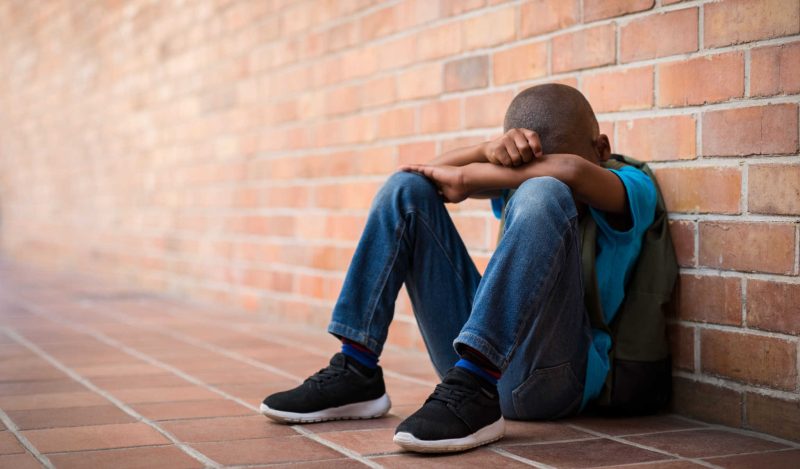COVID-19 pandemic policies and zeitgeist have seriously messed with kids.
Lockdowns and other restrictions brought on by the pandemic have really taken a toll on teenagers, causing disruptions to education and socialization that have led to increased anxiety and worsening mental health. The pandemic has also caused a global increase in child labor, and an estimated 228,000 children in South Asia have died due to supply chain snafus. These realities have further exacerbated existing inequalities and caused developmental delays in babies in these countries.
To combat the pandemic, masks and isolation were implemented in many places, including schools. The Head Start program (which just this week will allow all kids to go maskless) published concerns almost a year ago about the effects of COVID-19 rules on their students. There have also been reports of increased infant abuse and child sex abuse during the pandemic, likely due to stress and isolation. The lockdowns and other restrictions have also caused spikes in diabetes and obesity in children, and the cancellation of sports has had a major impact on kids.
- Abusive head trauma in infants nearly doubled in the Paris metropolitan area during the second year of the COVID-19 pandemic, with cases increasing from 1.4 cases per month in 2020 to 2.7 cases per month in 2021 (adjusted incidence rate ratio [aIRR] 1.92, 95% CI 1.23-2.99, P=0.02)
- Mortality rates from abusive head trauma in infants jumped nearly 10-fold in 2021 (odds ratio 9.39, 95% CI 1.88-47.00)
- The median age of infants with abusive head trauma in the study was 4 months, and 65% were male. Of the 99 cases studied, 87% had bridging vein thrombosis, 75% had retinal hemorrhages, 32% had fractures, 26% had status epilepticus, and 20% had skin injuries.
- 39 billion missed school meals by January 2021.
Millions of estimated life-years lost among students in the USA alone.
Dr. Scott Atlas recently wrote an excellent piece in the New Criterion: “All honest leaders, all individuals with integrity, should acknowledge that people were directly damaged and even died from the censorship of truth.”
Here are just some of the stats that Scott highlights in his piece:
- A review from 2006 indicated that lockdowns are both ineffective and harmful
- Lockdowns should not be seriously considered due to their negative effects
- The closure of in-person schools and the use of experimental drugs in schoolchildren has had negative consequences for children in the US
- Children have a low risk of serious illness or death from COVID-19
- Most transmission of COVID-19 to children comes from adults
- There is no evidence that opened schools pose a significant risk to children, communities, or teachers
- The median IFR for children under 19 was 0.0003% during the pre-vaccination period (until the end of 2020)
- No excess deaths among children and adolescents were observed in countries with reliable death registration data during the pandemic
- The number of fatalities among children under 5 from all causes was 25-50 times higher during lockdowns compared to the five previous years
- The overall number of child fatalities from all causes was 4-10 times higher during lockdowns compared to the five previous years
- Lockdowns resulted in a 10-20% increase in new cases of severe child abuse and a 50-80% increase in fatalities from child abuse
- Lockdowns caused a 30-50% increase in cases of malnutrition and a 50-100% increase in fatalities from malnutrition
- Lockdowns resulted in a 40-60% increase in new cases of mental illness in children and adolescents and a 100-200% increase in suicides by young people
- Lockdowns caused a 50-80% decrease in vaccination rates for children, leading to outbreaks of preventable diseases
- Lockdowns resulted in a 50-80% decrease in diagnosis and treatment of chronic diseases in children, leading to significant morbidity and potential long-term harm
- Lockdowns had a negative impact on children’s education and development, with long-term consequences for their prospects and well-being.
In the face of pandemic fears, some countries began administering vaccines to children. However, the UK health authorities have long stated that the vaccine has underperformed in children, and the country has started making damage payments as a result. Germany, on the other hand, is not advising the vaccine for most children at all.
Some of the bravest authors came together to look at vaccines. Their study assessed the risk and benefit of COVID-19 vaccine booster mandates for young adults aged 18-29 at universities. The researchers found that to prevent one COVID-19 hospitalization in a 6-month period, it would be necessary for 31,207 to 42,836 young adults to receive a third mRNA vaccine. The study also found that booster mandates for young adults are expected to result in a net harm, with at least 18.5 serious adverse events anticipated for each COVID-19 hospitalization prevented.
These serious adverse events may include booster-associated myopericarditis in males, which typically requires hospitalization, and grade ≥3 reactogenicity interfering with daily activities. The researchers concluded that booster mandates for young adults at universities are unethical because they do not consider updated risk-benefit assessments for this age group, may result in a net harm to healthy young adults, are not proportionate to the anticipated benefits, violate the reciprocity principle, and may have wider negative societal impacts.
One in 500 kids under the age of five were hospitalized after receiving the vaccine. To prevent one COVID-19 hospitalization over a 6-month period, it is estimated that 31,207-42,836 young adults aged 18-29 years must receive a third mRNA vaccine.
- There will be at least 18.5 serious adverse events from mRNA vaccines per COVID-19 hospitalization prevented, including 1.5-4.6 booster-associated myopericarditis cases in males (typically requiring hospitalization).
- There will be 1,430-4,626 cases of grade ≥3 reactogenicity (interference with daily activities, but typically not requiring hospitalization) per COVID-19 hospitalization prevented.
- The prevalence of prior SARS-CoV-2 infection is high.
- Current vaccines do not significantly reduce transmission.
- The age at peak risk for myopericarditis is 16-17 years.
Next, the mental health issues are legion:
- 44.2% of high school students in a nationwide survey of 7,705 students described persistent feelings of sadness or hopelessness that prevented them from participating in normal activities.
- 9% of students in the same survey reported attempting suicide.
- 55.1% of teenage respondents in the same survey said they suffered emotional abuse from a parent or another adult in their house in the preceding year.
- 11.3% of teenage respondents in the same survey said they suffered physical abuse.
There are many people who need to be held accountable.
Here are some relevant studies and reports to get more info (via our friend The Robber Baron!):
- Covid is low risk for Immunocompromised kids
- Long COVID in children is rare
- Lockdowns are devastating to teens
- Covid rules devastated teenagers
- Covid disruptions increased global child labor
- Covid disruptions killed 228,000 kids in S. Asia
- Covid rules exacerbated inequalities
- Covid rules increased anxiety in kids
- Restrictions led to developmental delays in babies
- Lockdowns caused child dev. Crisis
- Health director says vax underperformed in kids
- UK begins vax damage payments
- Lockdowns deeply hurt kids
- Covid rules may cause millions more child marriages
- Lockdowns caused more child labor
- Restrictions decimated children’s mental health
- Restrictions severely limited kids physical activity
- Masks & isolation hurt child development
- Head Start upset about Covid rules
- Kids likelier to have “long-covid” if parents have it
- Lockdowns caused spikes in infant abuse
- Kids in Head Start are still being masked
- Child abuse spiked during lockdowns
- Lockdowns caused diabetes spike in kids Lockdowns caused obesity spike in kids
Reposted from the author’s Substack
Join the conversation:


Published under a Creative Commons Attribution 4.0 International License
For reprints, please set the canonical link back to the original Brownstone Institute Article and Author.









